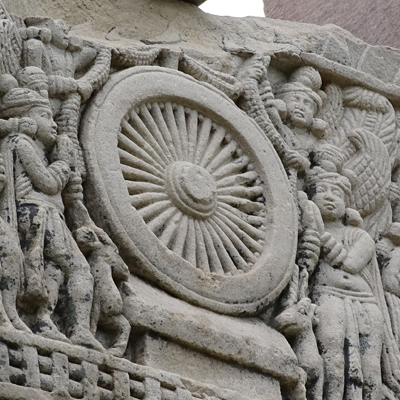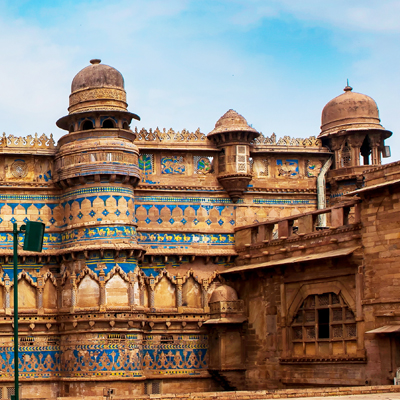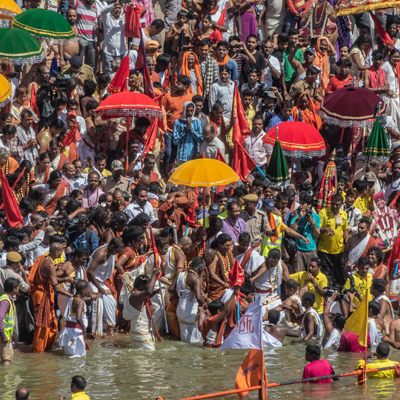Central Indian City Guide - Gwalior
A city steeped in history, Gwalior is situated in the Indian state of Madhya Pradesh. This age-old historic city stands as a testament to the rise and fall of empires, with its heritage meticulously preserved through remarkable landmarks.
Gwalior - City Guide
Gwalior's history is a tale of courage and cultural richness. It rose to prominence in the 8th century under the rule of the Tomar Rajputs. However, it was during the reign of Raja Man Singh Tomar in the 15th century that Gwalior reached its zenith, leaving an indelible mark through the majestic Gwalior Fort. Subsequently, the Mughals took control, leaving behind architectural marvels like the Man Singh Palace. In the 19th century, Gwalior came under the rule of the Scindias, a Maratha dynasty, contributing significantly to its development.
Gwalior, renowned for its hilltop fort and its classical music, is adorned with grand palaces and majestic temples that echo the splendour of its glorious history. The Gwalior Fort, often hailed as 'The Pearl Amongst Fortresses in India,' stands as a symbol of medieval splendour.
The famous Gwalior Sun Temple, the intricately designed Sas Bahu Temple, the opulent Jai Vilas Palace featuring the world's largest chandelier, and the captivating Scindia Museum are all popular stops. The tomb of Tansen, the musical genius, adds yet another layer of cultural richness to this historic city. Gwalior's bustling markets and local cuisine also offer a glimpse of its vibrant culture.
A destination echoing with the valour of its warriors, the melodies of its musicians, and the grandeur of its architecture, Gwalior is an essential addition to every traveller’s bucket list.
Major Attractions:
- Gwalior Fort.
- Gwalior Sun Temple.
- Jai Vilas Palace.
- Sas Bahu Temple.
- Gujari Mahal.
- Teli Ka Mandir.
- Man Mandir Palace.
- Scindia Museum.
- Gwalior Zoo.
- Tomb of Ghaus Mohammed.
- Kuno-Palpur Wildlife Sanctuary.
- Tighra Dam.
- Tomb of Tansen.
Climatic Condition:
Gwalior features a subtropical climate characterized by hot summers and cool winters. Summer season (March to June) in Gwalior can be unbearably hot, making daytime sightseeing challenging. On the other hand, the winter season (November to February) offers pleasant and cool climate, making it the ideal time to explore the city. Monsoons provide relief from the scorching summer, but they increase humidity. However, the nights are relatively cooler during the monsoon period.
Best time to visit:
October to March.
Things to Do:
- Temple Visit.
- Explore the Forts and Historic Sites.
- Attend the Sound & Light Show at Gwalior Fort.
- Sightseeing.
- Shopping.
- Photography.
How to reach:
By Air:Rajmata Vijaya Raje Scindia Air Terminal (Gwalior Airport) is the nearest airport to Gwalior, situated approximately 14 Km away. Buses and cabs are easily available from the airport to Gwalior.
By Train:Gwalior Junction Railway Station is the nearest railway station to Gwalior, situated just 1 Km away. Buses and cabs are easily available from the railway station to Gwalior.
By Road:You can reach Gwalior by road through a well-maintained network of highways.
FAQ:
1.What Is Gwalior Renowned For?
Gwalior is renowned for being the birthplace of the legendary musician Tansen, a prominent figure in Akbar's court.
2.What Are The Famous Local Dishes of Gwalior?
Gwalior is famous for its mouth-watering culinary offerings, including delectable Kebabs, flavourful Biryanis, mouth-watering sweets like Jalebi and Poha being local favourites.
3.Gwalior Is In Which State?
Gwalior is in the state of Madhya Pradesh, India.
4.What Is The Ideal Duration For a Gwalior Trip?
A trip of 2-3 days is ample to explore Gwalior and visit all the major attractions as well as experience the rich history and culture of this city.
5.Which Is The Most Renowned Festival in Gwalior?
The Tansen Music Festival, held every year in the month of December, is arguably the most famous festival in Gwalior. This acclaimed four-day event draws renowned musicians from all over India, uniting in homage to the musical maestro, Tansen. The festival takes place at his tomb in Gwalior.




